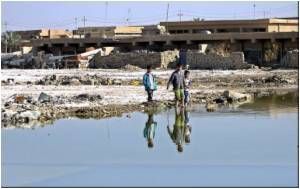
Trials with a magic mix of chemicals, called Cloevis, on sewers in the Gold Coast region in Australia stopped 99 per cent of the rotten egg gas or hydrogen sulphide emitted from these pipes.
Lead researcher, Professor Zhiguo Yuan from the University of Queensland, told IWA delegates that one week after dosing for a few hours, in most cases the gas level increased to less than one fifth of its emissions prior to the treatment, and this has been repeatedly observed over a period of five months.
"We are currently looking to commercialise Cloevis and are doing a further four trials of the mix in the US and Canada," Professor Yuan says. "Our partners over there are very excited by Cloevis' potential".
The gases causing the bad smells in sewers also play a role in corroding sewer pipes, which is another costly problem especially in warm climates.
Professor Yuan's team, involving active participation from key members of Australia's water industry, is also working on corrosion issues and have another study into chemical free methods for managing hydrogen sulphide gas.
Advertisement
Other speakers at the IWA conference spoke about managing bad smells from sewers and wastewater drains once they had escaped. Dr Valentina Lazarova from France reported on trials on the strong smells coming from the Oued El Harrach River in Algiers. Her team used jasmine-smelling micro sprays on the highway crossing the river and gels on pedestrian bridges nearby to mask the smells.
Advertisement
Zdaravka Doquang from France talked about how to determine how bad a sewage-based smell is for people, with regards to both its type and intensity of smell. Her team has developed an 'odour wheel' for sewage smells that: "helps to classify odours and ensure a common language to communicate about the odours."
"People are most sensitive to hydrogen sulphide or rotten egg gas compounds both qualitatively and quantitatively compared to any other compounds," she says.
Source-Eurekalert








